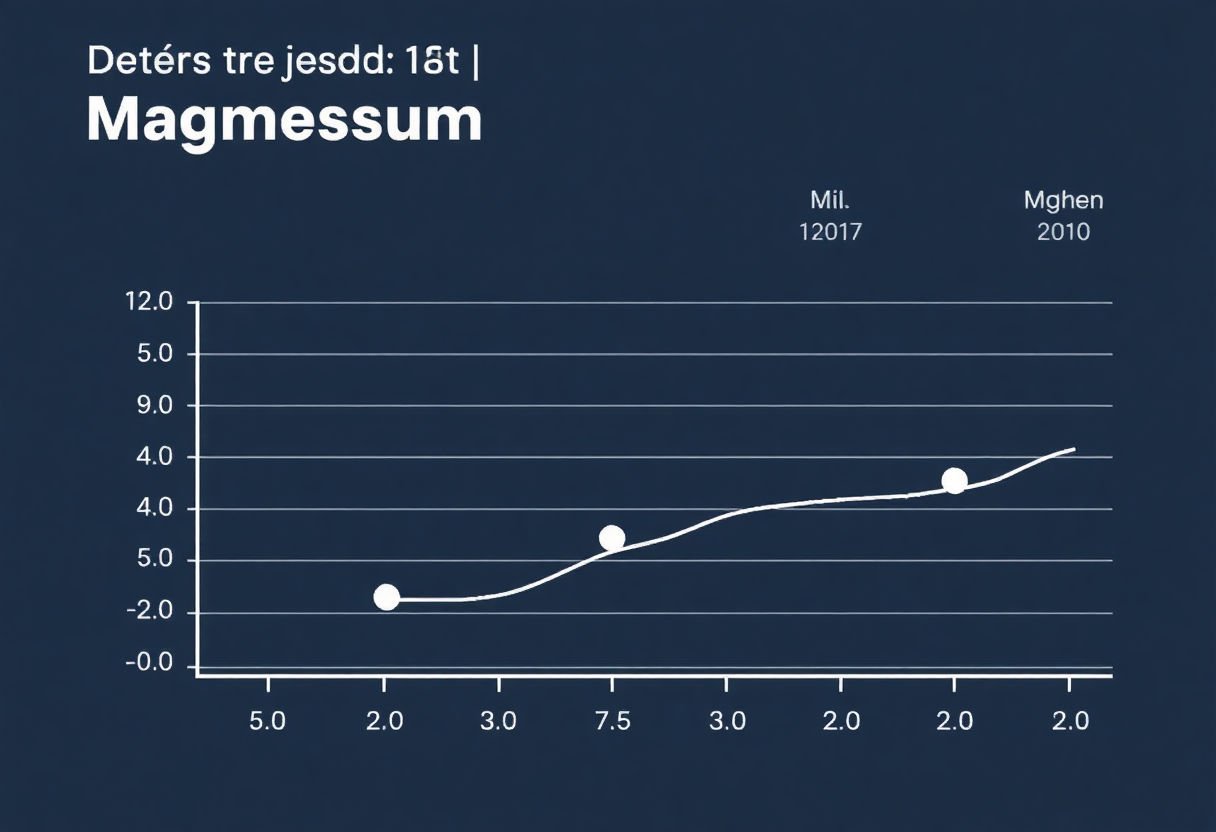Magnesium complex stands out as a vital nutrient for health. Why? It supports many body functions, from heart health to mental well-being. This guide will cover its benefits, proper intake, and how to choose the right supplement. We’ll explore its impact on heart health, bone strength, and mood. Knowing how it interacts with other nutrients is key too. Curious about finding magnesium naturally? We’ll discuss that, along with any side effects and precautions. Dive into understanding why magnesium complex is a must-have for health.
Key Takeaways
- Magnesium complex supports heart health, strong bones, and mental well-being.
- It combines different forms of magnesium for better absorption.
- Daily intake needs may vary based on individual health goals.
- Consider purity, dosage, and possible allergens when choosing a supplement.
What is Magnesium Complex?

Magnesium complex is more than just regular magnesium. It is a blend of different forms of magnesium. Each form comes with its own benefits. Together, they make a powerful team that supports health.
Imagine a toolbox. You could have a hammer. But a full set of tools is much more useful. This is like magnesium complex. You get more from a blend than just one type.
Different types of magnesium interact with the body in unique ways. Magnesium citrate works well for digestion. It helps keep things moving smoothly. Magnesium glycinate is known for calming properties. It can help with sleep and stress.
This blend may offer health benefits that a single form cannot. It supports energy production. It helps maintain normal blood pressure. It also plays a role in keeping bones strong.
So, why choose a magnesium complex? It targets multiple health needs at once. You could get better results with various magnesium forms working together.
Health Benefits of Magnesium Complex

Magnesium Complex offers many health benefits. It helps the heart work better by maintaining a steady heartbeat. This mineral relaxes the blood vessels, lowering the risk of heart problems. A healthier heart leads to a better quality of life.
For bones, magnesium is like a friend to calcium. It works with calcium to keep bones strong and healthy. People with more magnesium often have lower chances of broken bones or bone diseases as they age.
The impact on mental well-being is notable too. Magnesium helps in managing mood swings, reducing feelings of anxiousness, and improving sleep. Good sleep boosts energy and focus during the day.
Another plus is digestion. Magnesium keeps bowel movements regular, which can prevent stomach pains. By relaxing muscles in the gut, magnesium helps food move smoothly through the system.
Muscle health also benefits. Magnesium stops muscle cramps and spasms, making recovery from exercise faster. This is useful for athletes and people who do strenuous work.
Some studies hint that magnesium might help control blood sugar levels. Although more research is needed, this could mean a lower risk of developing diabetes for those with enough magnesium in their diet.
including more magnesium in your routine is easy. Eat foods rich in magnesium like nuts, seeds, and leafy greens. Or consider a magnesium complex supplement. Your body will thank you for it.
Daily Recommended Intake

Magnesium plays a crucial role in keeping our bodies healthy. But how much should you take each day?
The daily recommended intake for adults varies. Men need about 400-420 mg per day, while women need around 310-320 mg. Pregnant women may need more—closer to 350-360 mg. Children need less, but it still depends on age.
Getting the right amount of magnesium is like filling a car with fuel. Too little won’t keep your body running well, while too much can cause issues like diarrhea.
Magnesium from foods like nuts, seeds, and leafy greens is the best choice. If your diet lacks these, a magnesium complex supplement can help. It combines magnesium with other nutrients to enhance absorption.
Those with certain health conditions, like kidney problems, should consult a doctor before taking supplements. Always check labels for dosage. More is not always better. It’s key to find a balance that suits your body’s needs.
A balanced diet and the right supplements, if needed, keep your magnesium levels healthy. This ensures your body functions at its best. Always ask a health professional if unsure about taking supplements. This way, you stay safe and healthy.
Factors to Consider When Choosing a Supplement
Choosing the right magnesium complex supplement involves a few key points. Let’s break it down:
1. Purity and Ingredients
You want a supplement free from harmful additives. Look for labels that say “pure” or “natural.” Check for any additional ingredients. Sometimes, extra vitamins or minerals may not suit everyone.
2. Dosage
Think about how much magnesium you need daily. Your doctor can help here. Some might need a high dose; others, less. Read the label to know how much magnesium you get per pill or serving.
3. Forms of Magnesium
Magnesium comes in several forms, like magnesium citrate or magnesium oxide. Each has a different absorption rate. Magnesium citrate absorbs well, meaning your body takes it in easily.
4. Allergens and Sensitivities
Check if the supplement has common allergens. Some people react to gluten or dairy, often found in capsules or fillers. If you have allergies, look for allergen-free versions.
5. Price and Brand Reputation
Not all high-priced supplements are good. Research trusted brands known for quality and safety. Look for reviews from other users to see how they found the product.
6. Certifications
Certifications show a product meets certain standards. Keep an eye out for ones like USP (United States Pharmacopeia) or NSF (National Sanitation Foundation). They test supplements for quality.
With these points in mind, you can pick a magnesium supplement that fits your needs and supports your health goals.
Common Sources of Magnesium
Magnesium exists in many foods we eat every day. Eating a variety of these foods can help you get enough magnesium.
Leafy Green Vegetables
Spinach and kale are great sources. They help boost your magnesium intake with every serving. Add them to salads or smoothies for a healthy twist.
Nuts and Seeds
Almonds, cashews, and pumpkin seeds offer a rich supply of magnesium. Enjoy them as snacks or toss them in yogurt for added crunch and nutrition.
Whole Grains
Quinoa and brown rice pack a magnesium punch. Swap out white rice or bread for these whole grains to make your meals more nutrient-dense.
Legumes
Beans, lentils, and chickpeas are known for their magnesium content. They serve as excellent additions to soups and stews, providing both flavor and health benefits.
Fish
Fatty fish like salmon and mackerel provide magnesium along with omega-3 fatty acids. Grill or bake them for a filling and healthy meal.
Dark Chocolate
Believe it or not, dark chocolate contains magnesium too. Opt for a bar with at least 70% cocoa for the best health benefits.
By including these foods in your diet, you can maintain healthy magnesium levels. Eating a mix of these nutritious foods makes it easier for your body to absorb magnesium. Aim to add a bit of each category to your meals. These small changes can make a big difference in overall health.
Side Effects and Precautions

Taking magnesium complex can be helpful. But, like any supplement, it can cause side effects. Most people tolerate it well, but some may feel mild stomach issues. This can include loose stools or an upset stomach. If you notice these, you might lower your dosage.
Some side effects include:
- Diarrhea
- Nausea
- Stomach cramps
People with kidney problems should talk to their doctor before taking magnesium. Too much magnesium in the body can lead to health issues like low blood pressure. It’s best if a healthcare provider guides the dosage for those with kidney problems.
Precautions:
-
Pregnant or Nursing: Talk to your doctor. While magnesium is often safe, individual needs can vary.
-
Medication Interaction: Some drugs, such as antibiotics or blood pressure meds, might interact with magnesium. Check with your doctor to avoid conflicts.
-
Allergies: Be aware of ingredients in magnesium supplements. Avoid any known allergens.
Think of magnesium as a helpful tool. It works best when used carefully and wisely. Always keep your health and well-being as top priorities.
Interactions with Other Nutrients and Medications

Magnesium complex plays a key role when mixed with other nutrients and medications. It can act like a team player or, sometimes, a little trickster. Let’s break it down.
Calcium and Magnesium: They are like best friends. Your body needs both for strong bones. But, if you take too much calcium, it might push magnesium aside. They work well when balanced just right.
Iron and Magnesium: Think of them as classmates. They get along, but when taken at the same time, iron can make it harder for your body to soak up magnesium. If possible, take them at different times.
Certain Supplements: Vitamin D and magnesium get along great. Vitamin D helps your body use magnesium better. They’re like teammates, scoring goals for your health.
Medications: Some medications might change how your body uses magnesium. Diuretics, often called “water pills,” can lower magnesium levels. Antacids or laxatives with magnesium might lead to too much magnesium if not careful. Always chat with your doctor when mixing supplements and medications.
Alcohol: This can act a bit like a bully. It can empty out magnesium from your body, making you need more to keep levels where they should be.
When taking magnesium complex, balance is key. It’s like a puzzle where each piece needs the right fit. Your body will thank you for the thoughtful arrangement.
Conclusion
Magnesium complex plays a key role in supporting heart health, bone strength, and mental well-being. It stands apart from basic magnesium with its unique benefits. By integrating magnesium complex into daily routines, individuals can see improvement in overall health. But it’s important to choose supplements wisely, keeping purity and dosage in mind. As we learn more, its application in health maintenance may grow. Embrace this vital nutrient for a healthier life.
Frequently Asked Questions
How does magnesium complex differ from regular magnesium supplements?
Magnesium complex combines several forms of magnesium, enhancing absorption and benefit. This blend provides a broader range of health support than regular magnesium alone.
Can magnesium complex help with stress relief?
Yes, many people find magnesium complex reduces stress and anxiety. It supports nerve function and helps balance mood.
What is the daily recommended intake of magnesium complex?
Adults typically need 310-420 mg of magnesium daily. The complex fits within this need, but consult a doctor to tailor the amount to your health needs.
Are there side effects from taking magnesium complex?
Some may experience diarrhea or upset stomach. If you notice these, try a lower dose or talk to your healthcare provider.
Can magnesium complex interact with medications?
Yes, it can affect other medications like antibiotics or blood pressure drugs. Always check with a healthcare professional to manage possible interactions.
